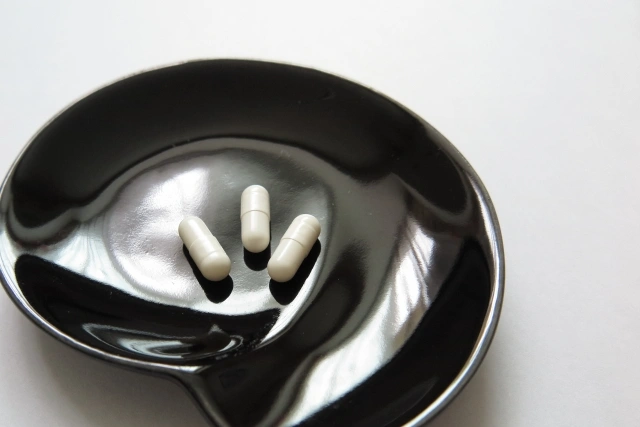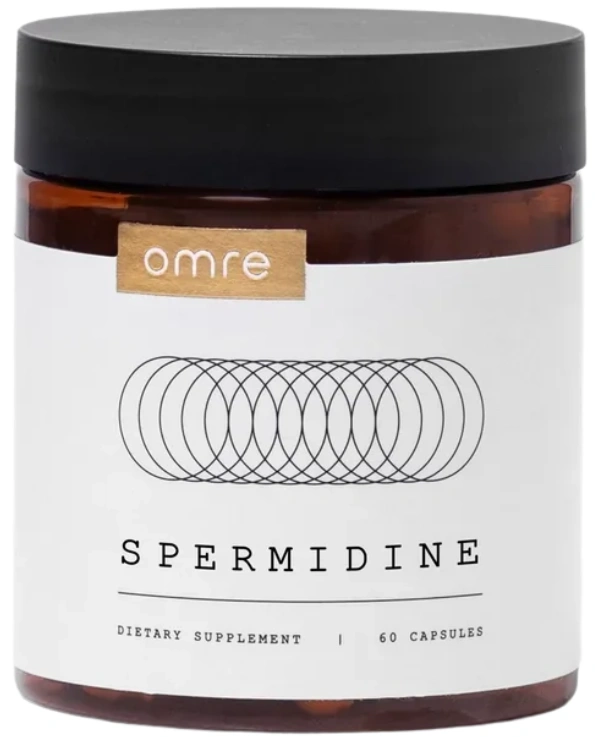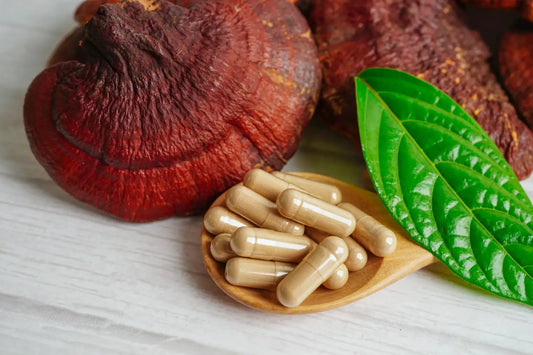Table of Contents
Most people take between 5 mg and 10 mg of spermidine per day, which research suggests is a safe and effective daily spermidine dosage for supporting longevity, healthy aging, and cell renewal.
In this article, we’ll explain what spermidine is, how much you should take daily, what factors affect your ideal dose, and the best ways to take it through food or supplements.
Key Takeaways:
-
The recommended spermidine dosage per day is typically 5–10 mg.
-
Some studies show short-term use of 20 mg is also safe.
-
Natural spermidine levels decline with age, making supplementation helpful for longevity.
-
Foods like wheat germ, mushrooms, and aged cheese contain small amounts, but supplements provide a more consistent daily dosage.
Cellular autophagy activator, providing a potent and highly purified dose of Spermidine.*Spermidine
What Is Spermidine?
 Spermidine is a natural compound that helps your cells stay healthy by supporting a process called autophagy. This process removes damaged parts of cells so your body can replace them with new ones. That is one reason spermidine is gaining attention for its role in healthy aging.
Spermidine is a natural compound that helps your cells stay healthy by supporting a process called autophagy. This process removes damaged parts of cells so your body can replace them with new ones. That is one reason spermidine is gaining attention for its role in healthy aging.
Your body makes spermidine on its own, but levels drop as you age. You can also get it from certain foods like wheat germ, mushrooms, and aged cheese.
However, the amount you get from food can be low and hard to measure, which is why many people turn to supplements.
Researchers are especially interested in spermidine because of its link to better heart health, memory, and longer lifespan in lab studies.
While human research is still ongoing, early findings look promising.
Recommended Spermidine Dosage Per Day
 For healthy aging and longevity, most studies use a daily spermidine dosage between 5 and 10 mg. This range appears effective for supporting autophagy and overall cellular health.
For healthy aging and longevity, most studies use a daily spermidine dosage between 5 and 10 mg. This range appears effective for supporting autophagy and overall cellular health.
Research suggests that doses up to 6 mg are well tolerated, and many supplements now offer 10 mg per serving (1).
This dose is often used in studies focused on healthy aging and autophagy. Higher doses, like 20 mg, are also considered safe for short-term use in healthy individuals (2).
It’s best to start with a lower amount and slowly increase it if needed. This helps your body adjust and reduces the chance of mild side effects like bloating or stomach discomfort.
Here’s a quick look at recommended spermidine dosages per day based on different goals and research findings:
Factors That Affect How Much Spermidine You Need
How much spermidine you need each day can vary based on several things:
Your age: Older adults may need more because natural spermidine levels drop with age.
Your diet: If you eat a lot of spermidine-rich foods, you may not need as much from supplements.
Your health goals: Higher doses may be used for specific goals like anti-aging or hair support.
Your supplement type: Pure spermidine gives you an exact dose, but food-based options are harder to measure.
Your gut health: A healthy gut may help your body produce or absorb more spermidine naturally.
How to Take Spermidine
There are many ways to take spermidine, depending on what works best for your lifestyle and preferences:
Capsules or tablets: A convenient way to get a precise dose. Omre Spermidine provides 10 mg of natural spermidine from premium wheat germ extract, with 1000 mg per serving to support cell renewal.
Powders: Can be mixed into smoothies, yogurt, or drinks if you prefer not to take pills.
Drops: More concentrated and can be taken directly or mixed into a beverage. These are ideal for those who want faster absorption.
Gummies: A convenient and tasty option. Some brands offer up to 25 mg of spermidine per gummy, which is one of the highest concentrations available.
Natural sources: You can get spermidine from foods like wheat germ, mushrooms, aged cheese, soybeans, and green peas. But the amount in food is low and not easy to measure.
Spermidine
Cellular autophagy activator, providing a potent and highly purified dose of Spermidine.*
How Much Spermidine Is Too Much?
Most people tolerate a spermidine dosage per day of up to 10 mg very well, and even doses as high as 20 to 40 mg have been shown to be safe in short-term studies.
However, taking more than you need doesn’t always mean better results, and may lead to mild side effects in some people.
While research in humans is still developing, studies have tested high doses for short periods without serious problems.
Still, it’s best to stay within the 5 to 10 mg range unless advised otherwise by a healthcare provider. Starting low and slowly increasing your dose gives your body time to adjust and helps you avoid discomfort.
At higher doses, some people may notice mild issues like bloating, nausea, or stomach upset. If that happens, reducing your dose or taking it with food often helps.
Always check the label and avoid doubling up on products without knowing the total amount you’re taking.
Spermidine from Food vs. Supplements
 Spermidine is naturally found in many plant-based foods. Wheat germ, soybeans, mushrooms, and aged cheese are some of the best sources. Eating a variety of these foods can help support your overall intake, especially if you enjoy a Mediterranean-style diet.
Spermidine is naturally found in many plant-based foods. Wheat germ, soybeans, mushrooms, and aged cheese are some of the best sources. Eating a variety of these foods can help support your overall intake, especially if you enjoy a Mediterranean-style diet.
The challenge with food sources is that spermidine content can vary, and it’s hard to know exactly how much you’re getting.
For general health, this might be enough, but reaching targeted amounts like 10 mg per day through food alone is difficult.
Supplements offer a more precise and convenient way to get a consistent spermidine dosage each day. This is especially useful if you're focused on cellular health, longevity, or other wellness goals supported by higher doses.
In short, food is great for general support and overall nutrition, while supplements are better for those who want a specific dose with measurable results.
How to Choose Spermidine Supplements
When choosing a spermidine supplement, it’s important to focus on quality, clear labeling, and the right dose for your goals. Look for products that clearly state how much spermidine you’re getting per serving so you can track your daily intake with confidence.
It also helps to choose brands that provide third-party testing or certifications to ensure purity and safety. Pay attention to the source of spermidine too.
Some products use synthetic forms, while others, like those made from wheat germ extract, offer a more natural option.
If you have dietary restrictions, check for gluten-free labels and full ingredient transparency before buying. Trustworthy brands will always make this information easy to find.
Tips for Taking Spermidine Supplements
-v1761094556748.webp) A few small habits can help you get the most from your supplement routine.
A few small habits can help you get the most from your supplement routine.
Take spermidine at the same time each day to build consistency.
Start with a lower dose and increase gradually if needed.
If you experience stomach discomfort, try taking it with food.
Store supplements in a cool, dry place away from sunlight.
Track how you feel over time to see if any benefits appear.
Conclusion
Spermidine is a promising compound that supports healthy aging, cell renewal, and overall wellness. Most people benefit from a daily dose of 5 to 10 mg, and research shows it’s safe to take even at slightly higher amounts.
While you can get some spermidine from food, supplements make it easier to reach consistent, research-backed levels. If you’re ready to add spermidine to your routine, choose a trusted, high-quality supplement made from natural wheat germ extract. Omre Spermidine offers 10 mg per serving with clean ingredients and third-party testing for purity.
If you’re ready to add spermidine to your routine, choose a trusted, high-quality supplement made from natural wheat germ extract. Omre Spermidine offers 10 mg per serving with clean ingredients and third-party testing for purity.
Try it for yourself and see how a small daily habit can make a meaningful difference in how you age.
FAQs
What’s the best spermidine dosage per day for longevity?
Most research points to a daily spermidine dosage of 5 to 10 mg for supporting longevity and healthy aging. This range helps promote autophagy, the body’s natural cell renewal process, which is linked to longer lifespan and better overall health.
Is 10 mg of spermidine a safe daily dosage?
Yes, 10 mg per day is considered safe and is one of the most common doses used in human studies. Clinical data also show that short-term use of higher doses, up to 20 mg, is well tolerated in healthy adults.
Can you get your daily spermidine dosage from food?
You can get some spermidine from foods like wheat germ, mushrooms, soybeans, and aged cheese, but the amount is usually small. To reach research-backed levels such as 5–10 mg per day, most people prefer using spermidine supplements for consistency and accurate dosing.
What happens if you take too much spermidine?
Spermidine is considered to have low toxicity in humans and animals. A study showed that even doses as high as 40 mg/day were safe and well-tolerated for up to 28 days. That said, extremely high amounts could potentially disrupt cellular balance, so it’s best to stick to recommended doses.
Can you get enough spermidine from food?
It’s possible to get spermidine from foods like wheat germ, soybeans, mushrooms, and aged cheese. However, dietary intake can vary, and reaching higher doses shown in studies may be challenging without supplements.
How long until I see results from spermidine?
Some people notice subtle changes within a few weeks, but benefits related to longevity and cell health often take longer and require consistent use.





